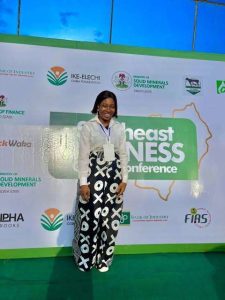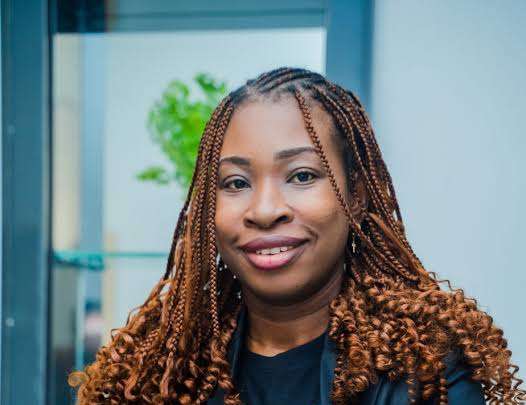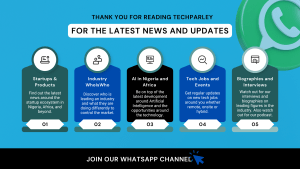At the 2025 Techpreneur Summit hosted in Lagos by the Development Bank of Nigeria (DBN), Eco-Cyclers, a youth-led waste recycling initiative founded by Ogechi Nwonye-Bernard, emerged as one of three standout startups awarded a share of DBN’s ₦13 million innovation grant.
The Enugu-based social enterprise received ₦3 million to scale its operations, which focus on environmental education, community recycling, and youth employment.
This recognition affirms the growing national importance of grassroots environmental solutions.
According to DBN Managing Director Dr. Tony Okpanachi, the summit was designed to support “innovative, scalable solutions by Nigerian entrepreneurs working to solve our most urgent socio-economic challenges.”
He noted that Eco-Cyclers “demonstrates how green initiatives can also serve as youth empowerment models.”
Educating, employing, and inspiring
Ogechi’s journey began with a simple desire to clean up her neighborhood but has since evolved into a community-led movement that is educating, employing, and inspiring.

Who is Ogechi Nwonye-Bernard?
Ogechi Nwonye-Bernard, a native of Okpanku in Aninri LGA of Enugu State, is the founder and driving force behind Eco-Cyclers.
She holds a Bachelor’s degree in English and Literary Studies from the University of Nigeria, Nsukka, and a Master’s in International Law and Diplomacy from the University of Lagos.
Before Eco-Cyclers, she worked in youth development, education, and advocacy programs, which laid the foundation for her commitment to sustainable impact.
Over the years, she has participated in several national fellowships including those by LEAP Africa and CivicHive, where she refined her skills in community organizing and social entrepreneurship.
Her comment
“Grateful to have come first place and been selected as one of the 5 entrepreneurs for grant funding of the SouthEast Business Growth Conference by the Ike Elechi Ogba Foundation in Ebonyi State.”
Her team of youth volunteers conducts sensitization campaigns in schools, markets, and churches, showing residents how to sort, store, and exchange recyclables for rewards such as cash, school supplies, or health kits.
Scaling Sustainability with the DBN Grant
Eco-Cyclers operates through a hybrid model that blends recycling education, community waste collection, and technology-based tracking.
To date, the group has reached over 300 households and collected more than 5,000 kg of recyclable waste, according to figures released on their social media and confirmed by CivicHive.
With the ₦3 million funding from DBN, the enterprise plans to:
- Expand its recycling hubs in Enugu from 3 to 10 locations
- Launch a mobile-friendly rewards platform where users can earn points for each kilogram of waste submitted
- Train and deploy 50 new youth “eco ambassadors” in rural schools and peri-urban areas
- Purchase basic logistics equipment, including protective kits and mobile tricycles for waste collection
This strategic scale-up aims not just to clean the environment but to create an ecosystem where young people earn income while tackling pollution.
In Enugu, where waste mismanagement remains a major issue, Ogechi’s project has already caught the attention of the state’s Ministry of Environment.
A ministry spokesperson who attended Eco-Cyclers’ Green Enugu Open Day said the project offers a “workable community-led model that deserves institutional support.”
Driving Broader Change in Nigeria’s Circular Economy
Eco-Cyclers’ emergence aligns with growing national and global interest in circular economy practices—where waste is treated as raw material, not landfill.
Nigeria generates over 32 million tonnes of solid waste annually, of which only 13% is recycled, according to the United Nations Industrial Development Organization (UNIDO). Initiatives like Eco-Cyclers fill the gap between government policy and street-level implementation.
The DBN’s ₦13 million grant pool was shared among three startups—BuyScrap (₦6 million), Qiqi Farms (₦4 million), and Eco-Cyclers (₦3 million)—selected for their innovation and relevance to DBN’s inclusive growth agenda. Each venture received both financial and technical support to build scalable, impact-focused enterprises.
For Ogechi and her team, the grant is not an endpoint but a springboard.
“We want Eco-Cyclers to be a national model,” she says. “The future is green, and Nigerian youth are ready to lead the way.”
As DBN and other stakeholders continue to look for tech-enabled, socially relevant enterprises to support, Eco-Cyclers serves as a powerful example of how innovation, education, and youth leadership can converge to create change —from the ground up.






